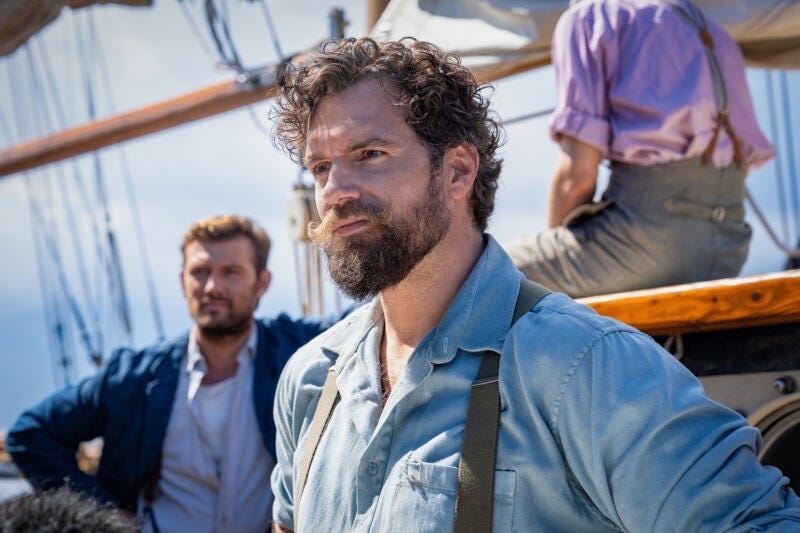‘The Ministry of Ungentlemanly Warfare’ is Guy Ritchie’s Nazi-killing jamboree
Ritchie assembles a fantastic cast to tell a unique, unheralded true story from World War II. But it could have been better
If you really can’t get enough of watching Nazis die violently on screen, there’s plenty to enjoy in The Ministry of Ungentlemanly Warfare, the latest action film from the ever-prolific director Guy Ritchie.
After two films in 2023 — the Jason Statham shoot-‘em-up Operation Fortune: Ruse de Guerre and the more earnest Afghanistan war film Guy Ritchie’s The Covenant — Ritchie returns to cheekiness, although the gravity of the Nazi takeover of Europe means it’s a bit less cheeky than usual, leading to some tonal confusion. Also, there’s no Statham- and longtime action stalwart Jerry Bruckheimer is on board as a producer.
The Ministry of Ungentlemanly Warfare tells a likely exaggerated version of the true story of Operation Postmaster. That was the top-secret operation in early 1942 when British spies stole a fleet of ships from the Nazis in the waters off the coast of West Africa. The film is inspired by disclosures only made public in 2016 and is based on a book by the British historian Damien Lewis, not to be confused with the British actor Damien Lewis.
The operation was crucial for several reasons: It helped establish British dominion over the seas during the war while also serving as a critical victory for the Special Operations Executive (SOE.) The episode also helped shape the James Bond mythos, with Ian Fleming on hand in intelligence meetings during the war. (He appears in the new film as a minor character, working for a real-life “M,” played by Cary Elwes.)
The Ministry of Ungentlemanly Warfare features some enjoyable action, and most (but not all) of the casting choices were good. But there are also some baffling filmmaking decisions. Overall, it’s trying to do many of the same things Tarantino’s Inglourious Basterds did, but not as successfully.
The tone is all over the place, and it also doesn’t help that the entire second half of the film is set at night and lit so dimly that it’s almost impossible to tell what’s happening most of the time.
The best Guy Ritchie movie of the year remains The Beekeeper, even if Ritchie didn’t make it or have anything to do with it.
The film gets off to a great start, as we see the core team of Gus March-Phillipps (Henry Cavill), Anders Lassen (Alan Ritchson), Freddy Alvarez (Henry Golding), and Henry Hayes (Hero Fiennes Tiffin) successfully repelling a Nazi attack on a boat. They’re later joined by Geoffrey Appleyard (Alex Pettyfer) along with the spy team of Mr. Heron (Dune veteran Babs Olusanmokun) and Marjorie Stewart (Eiza González).
The team has much fun banter, and while they’re all played by engaging performers, it’s essentially only González’s character who gets any depth or character development. She’s a beautiful spy who can also hit any target with any gun, can also sing, and has the Queen Esther-like backstory of being secretly Jewish while going after her Nazi target (Til Schweiger, who was also in Inglourious Basterds.)
At least Cavill gets something to do, unlike in the misbegotten Argylle, in which he had top billing but barely figured in the film at all; his mustache here is truly a sight to behold. Pettyfer played the audience POV character in the first Magic Mike movie in 2012 but wasn’t particularly good in it and disappeared after that. Still, he’s aged into a much more interesting actor.
Ritchson, best known from Reacher, is charismatic as always, even if it’s hard to get past the notion that people in the 1940s didn’t look like that. He’s almost a figure of myth, like The Bear Jew in Tarantino’s film; if Hollywood ever makes a movie about the Bar Kochba Revolt, they should cast Ritchson as Simon Bar Kochba. However, that would set off a Jewface-casting controversy that would make Bradley Cooper’s nose in Maestro look like nothing. (Eiza González isn’t exactly an intuitive choice to play a Jewish person either, although at least it’s supposed to be a surprise that she’s Jewish.)
While we’re on the topic of facial prosthetics, Rory Kinnear appears in Ritchie’s film as one of the movies’ less-convincing representations of Winston Churchill. Sure, playing him has a way of conferring lots of awards on people, including both John Lithgow and Gary Oldman, in the last ten years, but Kinnear doesn’t have the right look or voice. It’s still preferable to whatever that actor was doing at the end of Alex Garland’s Men, but that’s neither here nor there.
Guy Ritchie has several more movies in the works; it seems like a new one is announced once a month. I appreciate him hitting his stride at this stage of his career, but I hope his next few films can get the tone more right than The Ministry of Ungentlemanly Warfare did.





